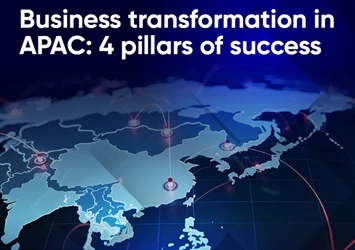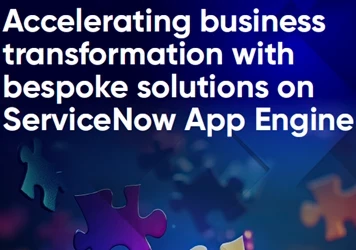Disruption, people and sustainable change: three lessons in operational excellence for pharma
How pharma businesses are embracing sustainable digital transformation, agility and efficiency in their operations
Add bookmark
Operational excellence has become a key goal for businesses operating within the global pharma industry, with speed, agility and efficiency proving critical for organizations attempting to maintain a competitive edge. According to McKinsey, many pharmaceutical companies historically deprioritized operational strategy in favor of competing business challenges. Disruption to the industry during the global Covid-19 pandemic forced a sea change in how the industry approached operational excellence ideals and practices.
The unique challenges of heightened compliance, patient safety and complexity faced pharma manufacturing only compounded the necessity for a focus on productivity improvements.
All Access OPEX Pharma brought together thought leaders from across the industry to discuss ideas, perspectives and emerging technologies being pushed forward in digital transformation. Below is a summary of the three key lessons learnt at the event.
Leading agile pharma operations: clarity, vision and strategy in change management
 Often in process improvement there is a focus placed upon the technology required to make it work, however, digital transformation cannot succeed without clarity in leadership, vision and strategy. In his opening keynote session at All Access OPEX Pharma, Fausto Artico, global R&D tech head and director of innovation and data science at GSK (pictured left), set out his views on achieving growth through a successful operational excellence strategy.
Often in process improvement there is a focus placed upon the technology required to make it work, however, digital transformation cannot succeed without clarity in leadership, vision and strategy. In his opening keynote session at All Access OPEX Pharma, Fausto Artico, global R&D tech head and director of innovation and data science at GSK (pictured left), set out his views on achieving growth through a successful operational excellence strategy.
The increasing acceleration in emerging technologies such as AI and automation has led to the introduction of competing systems. Artico said that no platform could architect such systems and process professionals lack the know-how to effectively architect them. A reliance on expert partnerships and effective networking, therefore, has become a requisite to ensuring such systems work together and competitivity can be maintained.
Artico noted that technical ability was necessary but not sufficient for achieving a successful OPEX strategy. “For this, we inevitably rely on people,” Fausto stated. “People want to be a part of something great and it is the role of leaders to facilitate this”. Fausto says that the right strategy cannot be created by just one person, but that leaders must be orchestrators, educators and facilitators to “make the dream possible”.
Is disruptive innovation the solution to persistent operational challenges?
 While discussions on emerging technology were prevalent across the event, one of the most exciting possibilities involving emerging technology lay with the practice of disruptive innovation. Joe Craughan, X disruptor at Novartis (pictured right), stated that “the most challenging aspect of digital transformation in the pharma industry is maintaining compliance”. Focusing on the success of Airbnb, the online holiday home marketplace, Craughan demonstrated how injecting a start-up mentality could solve persistent operational challenges.
While discussions on emerging technology were prevalent across the event, one of the most exciting possibilities involving emerging technology lay with the practice of disruptive innovation. Joe Craughan, X disruptor at Novartis (pictured right), stated that “the most challenging aspect of digital transformation in the pharma industry is maintaining compliance”. Focusing on the success of Airbnb, the online holiday home marketplace, Craughan demonstrated how injecting a start-up mentality could solve persistent operational challenges.
The session focused on how an ‘edge’ approach can uncover the biggest opportunities in the pharma industry’s ‘mega challenges’ through lab-based experimentation and innovative partnerships. With any experiment, the importance of knowing when to kill a project – if only for the time-being – was made clear throughout.
The success of disruptive innovation was well demonstrated through a case study on unbundling ROI, with Novartis’s internal organization Customer and Technology Solutions X (CTSX) delivering US$168mn NPS savings on a $7mn investment in less than two years. Exciting potential for experimenting with exploration of moon-shot ideas was discussed with reference to killing of GBS models, utilizing the metaverse and reimaging the ERP landscape with open-source solutions.
People are essential to sustainable change in pharma manufacturing
Another key theme throughout the event was the importance of people in OPEX strategies. While technology is often starting point to any improvement endeavor, ensuring the sustainability of change requires buy in from all relevant stakeholders within an organization.
 Nicholas Schmitz, senior operations manager at Bristol Myers Squibb (pictured left), stated: “Communicate, communicate, communicate; you can never over communicate.” Effective change leadership relies on effectively putting across the benefits of the change early in the process, communicating with end users and allowing stakeholders the opportunity to question the change.
Nicholas Schmitz, senior operations manager at Bristol Myers Squibb (pictured left), stated: “Communicate, communicate, communicate; you can never over communicate.” Effective change leadership relies on effectively putting across the benefits of the change early in the process, communicating with end users and allowing stakeholders the opportunity to question the change.
One of the most overlooked roles when maintaining sustainable change is that of informal leaders. These stakeholders, Schmitz said, carry more weight than is often appreciated and can be integral to effective change leadership.
Visit All Access OPEX Pharma to watch all sessions on-demand

























